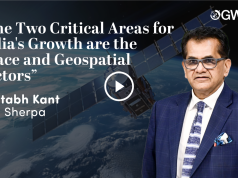The session held at the Geospatial Artha Summit, 2024 titled “Frontier Technologies: Expanding Market Value Chain of Indian Geospatial Industry,” proved to be a crucible of innovative ideas and insights on frontier technologies reshaping the landscape of the Indian geospatial industry.
Frontier technologies in this era include advanced technologies like AI, IoT, big data analytics, and blockchain. These technologies, when integrated with geospatial tools, enhance the capacity for data processing, real-time analysis, and predictive modeling.
Ongoing Evolution
“We inhabit an era of ‘creative destruction’, unanticipated disruptions, and fast-paced transformations, leading to newer alignments and synergies between geospatial and frontier technologies”, said Aditya Chaturvedi, Deputy Executive Editor, Geospatial World.
Vinay Simha, CEO, Skyserve, explored the impact of technologies like AI, IoT, cloud computing, digital twins, and the metaverse on geospatial operations.
These tools, he argued, are revolutionizing the management, distribution, and dissemination of geospatial data. A particular emphasis was placed on the use of AI and Machine Learning (ML) for driving effective actions and decisions.
Harsha Madiraju,
Driving Value
Vishal Dhupar, Managing Director, NVIDIA South Asia, emphasized Earth’s economic value and the urgent need for sustainable computing practices. He underlined the importance of accelerating computing processes to better understand and address complex global issues.
Dhupar highlighted AI’s role in making computing more accessible and efficient, presenting India with an opportunity to become the “back office of the world” in this arena.
AI and ML algorithms can be used to optimize data centre operations, one of the most significant energy consumers in the IT industry. These algorithms can predict and manage workloads, thereby reducing unnecessary energy consumption.
For instance, Google uses DeepMind’s AI to optimize energy usage in its data centres, achieving significant reductions in cooling energy usage.
Pavan Kumar, Senior Vice President, Global Indirect Business, Altair Engineering, shared insights on how to leverage AI and ML in mechanical simulation computing.
He stressed the importance of learning from proven data, particularly in the geospatial sector where trends are increasingly pointing towards the cross-integration of IoT and geospatial data.
The convergence of these technologies also presents unique challenges, particularly in terms of data management, privacy, and regulatory compliance.





